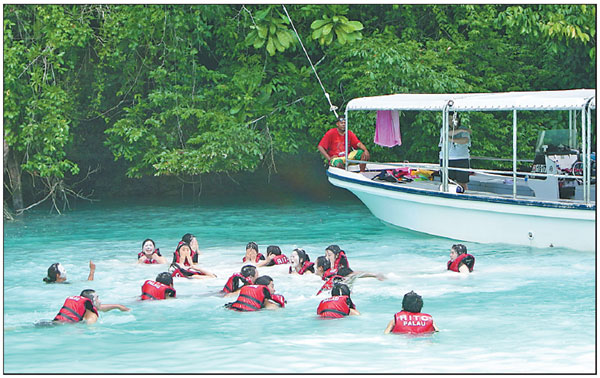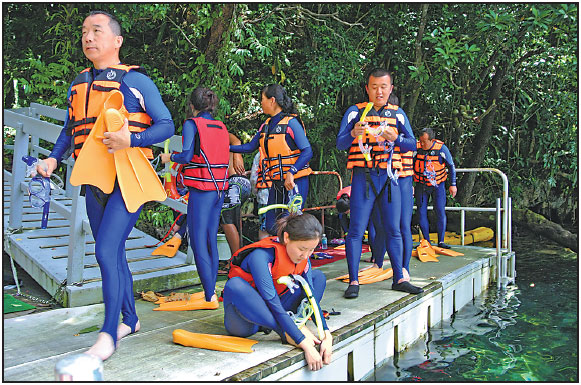Paradise lost
Updated: 2015-03-25 07:50
By Erik Nilsson/Yang Feiyue(China Daily)
|
||||||||
Palau seeks to curb Chinese tourist inflows as visitors oversaturate its attractions. Erik Nilsson and Yang Feiyue report.
Palau plans to halve charter flights from China next month, as it deliberates measures to subside the tourism tide that has surged into a tidal wave over the past year.
The tiny Micronesian-island nation of 18,000 people is straining to absorb the deluge of visitors washing over its shores. Tourists increased 34 percent to 141,000 last year, Agence France-Presse reports.
The industry generates about 85 percent of the archipelago's GDP.
Nearly 62 percent of visitors were Chinese this February, when China celebrated the Spring Festival Golden Week holiday. The 10,955 Chinese visitors - equal to half Palau's native population - represent a 500 percent year-on-year surge, the agency reports.
"This is a very sudden influx, so we are trying to understand the situation," Palau Visitors Authority managing director Nanae Singeo tells AFP.
"We have never experienced this much tourism before. And the magnitude is really giving us a lot of pressure. We are a very tiny country with scarce resources. So this sudden increase is an unknown challenge."
She later tells China Daily she can't provide comment because she's out of the country until next month.
"I am afraid my staff may not have the complete picture on this situation to answer to your detailed questions. I hope you can understand that it is a rather sensitive topic today in Palau," she says by e-mail.
"Many people have different opinions. And as the republic's marketing arm, we simply focus to promote Palau and we do not handle any policy-related matters."
None of the 23 hotels China Daily contacted - all recommended by the tourism authority's website - responded to interview requests.
Palau's president, Tommy Remengesau, recently told media that policies to curtail Chinese tourists aren't intended to discriminate.
"Do we want to control growth or do we want growth to control us? It will be irresponsible for me as a leader if this trend continues. I am not only looking at the present but, as a leader, I am looking after tomorrow."
Singeo tells media: "We are not seeing a growth rate to match the number of visitors. Tourists are up 34 percent. So, technically, we should see economic benefits at the rate of 30 percent or more. But that's not the case."
Roughly 6,000 Chinese visited Palau in 2013, Nandu.com reports. Flights transferred through Taipei, Seoul or Manila.
Chinese arrivals via Hong Kong and Macao soared to 50,000 since airlines started chartering flights in 2014 until this February, the website says.
Domestic travel agencies' Palau packages have burgeoned in pace.
"Most Chinese visit with tour groups because of language and service needs," explains Chinese-TV travel-channel producer Zhu Zi, who independently visited Palau with a friend on vacation in January.
More people from Guangzhou and comparable southern cities know the destination than travelers from such northern departure points as Beijing, Zhu says.
Online travel giant Ctrip launched its first Palau trips in 2013.
"We've seen rapid growth in the number of Chinese tourists to Palau since we started the route," Ctrip's tourism department marketing director Dai Yu says.
"The charter-flight reduction will protect natural resources and enhance travelers' experiences."
Zhu supports limiting Chinese sightseers.
"It's good to control tourism. Too many people will hurt the industry."
Li Min, a Chinese employee of Palau Vacation Hotel, which mostly caters to mainland tourists, has noticed last year's increase in visitors from her homeland and says February's festival spike is "no surprise".
"The chartered-flights cut is up in the air," she says.
"Heavyweights are talking to Palau's government about potential fallout."
Its popularity with Chinese largely hails from the fact mainlanders don't need visas.
"Anyplace without visa requirements gets lots of Chinese," Zhu says.
That impelled her decision, especially since she booked on impulse.
"I bought my (Palau) ticket in a hurry," she says.
"Beijing is too cold in winter. I wanted to go somewhere tropical. I thought about (China's) Sanya. But there are too many northern Chinese. It's too crowded."
She considered going to Thailand.
"But you need a visa," she says.
"We looked for the best hotels and didn't worry about prices. We cared more about better service."
She spent $6,000 on the seven-day trip but says weeklong visits average $4,000.
Palau Pacific Resort was the only place she could find on the beachfront.
Tianu.com offers several five-day "DIY" trips from Hong Kong in April for less than 5,000 yuan ($815).
"Visitors can enjoy the jellyfish lake, an undersea fault line and more than 7,000 reefs," the online travel website's media officer Sun Libin says.
Dai says many Chinese come to explore the seabed. She and Zhu point out the waters ripple with seven hues.
"You can see through the clear water to the bottom," Dai says.
But locals complain some Chinese kill coral and jellyfish, and they litter.
While many mainlanders come to enjoy the natural environment, some behaviors and sheer numbers damage the ecosystem that supports the country's pillar industry.
Indignation ensued after Chinese travel agency Yellow Skin Tour circulated a brochure showing Chinese tourists dangling a wild sea turtle by its flippers, media report.
Zhu says most tourists she met hailed from Japan and Taiwan, Palau's traditional source front-runners.
"If a restaurant has five tables, maybe one will have Chinese," she says.
"It's more of a destination for young Chinese. A few hotels get a lot of Chinese because they offer Chinese-language services."
No locals she encountered spoke much Mandarin. And most information was in the traditional characters ubiquitous in Taiwan but scarcer on the mainland.
Despite Palau's efforts to curb visits to safeguard sustainability, profitability may prove more powerful.
The apprehension is lust for short-term earnings may lead to long-term - even permanent - destruction of natural attractions that conjure the archipelago's allure.
Contact the writers through erik_nilsson@chinadaily.com.cn
|
Chinese tourists in Palau jump fromtheir speedboat in the 'MilkyWay', a picturesque lagoon on the Rock Islands. |
|
Chinese tourists get ready to swimin the worldrenowned 'jellyfish lake'. Photos By Sebastien Blanc / AFP |
(China Daily USA 03/25/2015 page7)

 Families mourn victims of Airbus A320 crash
Families mourn victims of Airbus A320 crash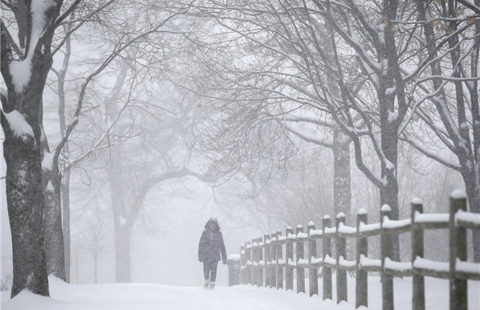
 Snow blankets Chicago after spring storm
Snow blankets Chicago after spring storm
 Haze descends on Paris
Haze descends on Paris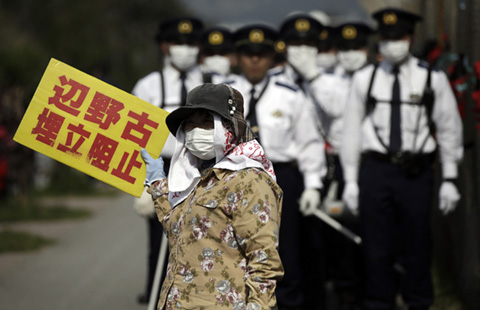
 Tokyo's plans to build new US base possibly scuppered
Tokyo's plans to build new US base possibly scuppered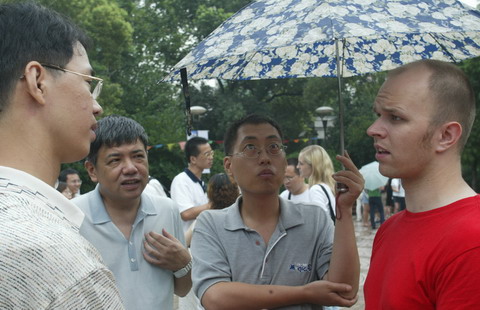
 Conversation topics only heard in China
Conversation topics only heard in China
 Zhejiang villager creates a world of clay
Zhejiang villager creates a world of clay
 Dramatic changes for Chinese miners in the last 30 years
Dramatic changes for Chinese miners in the last 30 years
 Top 10 young Chinese entrepreneurs defining the future
Top 10 young Chinese entrepreneurs defining the future
Most Viewed
Editor's Picks

|

|

|

|

|

|
Today's Top News
Plane crash in France kills 150, black box found
Small US businesses using RMB for transactions: Survey
Iconic Chinese play hits America
Christie's has richest Asia Week
China keen to invest in US
Beijing 'welcomes interested nations joining the AIIB'
Innovation is talk of summit on investment
House passes resolution urging Obama to send arms to Ukraine
US Weekly

|

|
